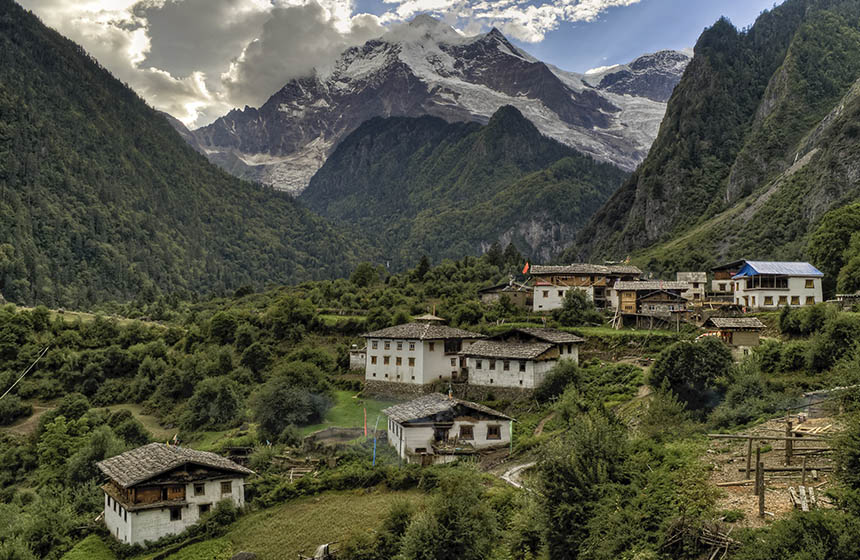Participatory integrated watershed management in Yunnan province
The Yunnan Green Watershed Management Research and Promotion Centre consists of an indigenous self-organization and participatory watershed management model, focusing on actions such as agroforestry, organic farming, tree planting, recovering fishing resources, water use management, wetland restoration, and forest protection.
Nature-based Intervention:
Four autonomous organizations for resource management were founded as part of the community initiative: two watershed management groups belonging to the Naxi and Yi communities, which have reportedly brought mudslides under control, established agroforestry projects which have increased incomes, and protected over 1,300 hectares of mountain forest. The remaining two organizations under the initiative consist of a fishermen’s association which has banned illegal nets and and works to recover and strengthen the local fishing industry, and a water users association which has successfully managed water access issues and negotiated fair upstream and downstream water use.
Overview of context and outcomes:
The initiative was formed in the aftermath of the Lashihai Dam project in 1998, which flooded large areas of farmland with impounded water and left the Naxi indigenous people displaced with few livelihood options other than farming unstable hillsides, leading to mudslides, and overfishing the Lashihai Lake.
Case effectiveness on
Climate change
Reforestation and wetland restoration have reportedly increased the climate change mitigation capacity of the watershed.
The resilience of the watershed was reportedly strengthened through wetland restoration efforts and improved protection of fish populations and other natural resources. The risk of mudslides and other disasters was found to be reduced significantly through the use of agroforestry and water management techniques, according to a project report.
Ecosystem health
Ecological effect: Positive1,330 hectares of forest have been protected by the initiative, reportedly resulting in mammal species such as the Rhesus Monkey and Asian Black Bear returning to their habitat. A ban on the use of certain fishing nets has been found to have contributed to the protection and rebound of various fish populations, as reported in a project document.
Socioeconomic outcomes
The average annual income of Yi and Naxi villagers reportedly rose 10 times compared to the level at the beginning of the project. Agroforestry reportedly helped curb soil erosion and wetland sediment deposition which increased water security, while food security was reportedly increased by restored fish stocks. Moreover, the local indigenous population was empowered through exercising their rights to resource management.
Governance
While it was still operating the Yunnan Green Watershed Management Research and Promotion Centre used a governance model of indigenous self-organization and participatory management.
Finance
Oxfam provided the initial funding to support the start of the project until 2006. After that the funding switched to a blend of international support with the money coming mainly from the World Bank and the Swedish International Development Agency (SIDA).
Monitoring and evaluation
There are no clearly reported monitoring protocols currently identified.
Trade-offs and limitations
The Yunnan Green Watershed Management Research and Promotion Centre has since shut down, limiting our insight into what practices are still used by the community and what benefits they still receive.

Intervention type
- Created habitats
- Food production
- Management
- Restoration
Conducted at landscape scale
Ecosystem type
- Created forest
- Ponds & lakes
- Montane/Alpine
- Terrestrial production
- Wetlands
Climate change impacts addressed
- Mudslides / Landslides
- Soil erosion
- Wildfire
Instigators
- Local NGO or CBO (eg. indigenous)
- Research institutions
Societal challenges
- Climate change adaptation
- Climate change mitigation
- Disaster risk reduction
- Economic and Social development
- Rights/empowerment/equality
- Food security
Outcomes
- Food security: Positive
- Water security: Positive
- Health: Not reported
- Local economics: Positive
- Livelihoods/goods/basic needs: Not reported
- Energy security: Not reported
- Disaster risk reduction: Not reported
- Rights/empowerment/equality: Positive
- Conflict and security: Positive
- No. developmental outcomes reported: 6
Resources
Read resource 1Literature info
- Grey literature



